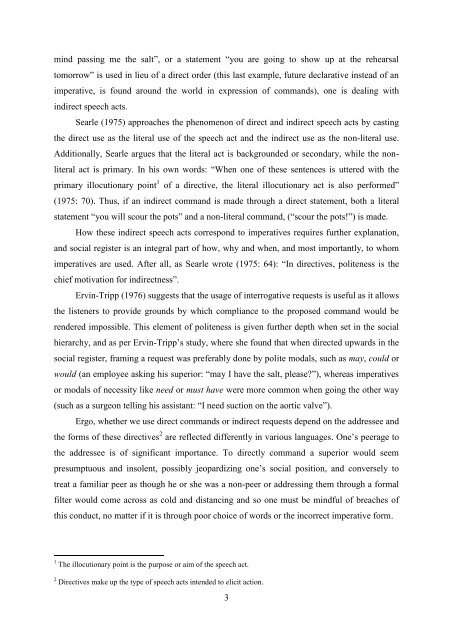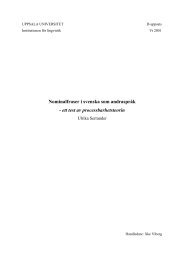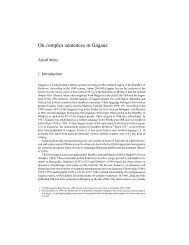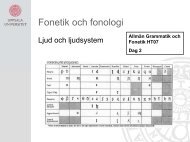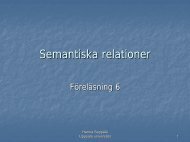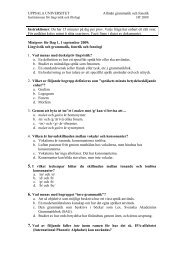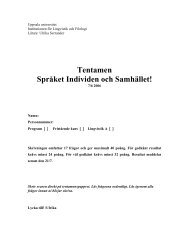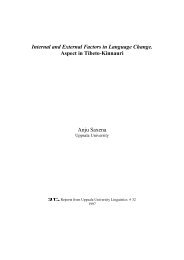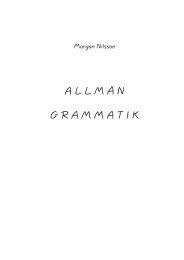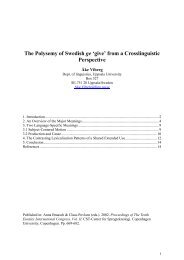The function of non-canonical imperatives in the languages of Europe
The function of non-canonical imperatives in the languages of Europe
The function of non-canonical imperatives in the languages of Europe
Create successful ePaper yourself
Turn your PDF publications into a flip-book with our unique Google optimized e-Paper software.
m<strong>in</strong>d pass<strong>in</strong>g me <strong>the</strong> salt”, or a statement “you are go<strong>in</strong>g to show up at <strong>the</strong> rehearsal<br />
tomorrow” is used <strong>in</strong> lieu <strong>of</strong> a direct order (this last example, future declarative <strong>in</strong>stead <strong>of</strong> an<br />
imperative, is found around <strong>the</strong> world <strong>in</strong> expression <strong>of</strong> commands), one is deal<strong>in</strong>g with<br />
<strong>in</strong>direct speech acts.<br />
Searle (1975) approaches <strong>the</strong> phenome<strong>non</strong> <strong>of</strong> direct and <strong>in</strong>direct speech acts by cast<strong>in</strong>g<br />
<strong>the</strong> direct use as <strong>the</strong> literal use <strong>of</strong> <strong>the</strong> speech act and <strong>the</strong> <strong>in</strong>direct use as <strong>the</strong> <strong>non</strong>-literal use.<br />
Additionally, Searle argues that <strong>the</strong> literal act is backgrounded or secondary, while <strong>the</strong> <strong>non</strong>literal<br />
act is primary. In his own words: “When one <strong>of</strong> <strong>the</strong>se sentences is uttered with <strong>the</strong><br />
primary illocutionary po<strong>in</strong>t 1 <strong>of</strong> a directive, <strong>the</strong> literal illocutionary act is also performed”<br />
(1975: 70). Thus, if an <strong>in</strong>direct command is made through a direct statement, both a literal<br />
statement “you will scour <strong>the</strong> pots” and a <strong>non</strong>-literal command, (“scour <strong>the</strong> pots!”) is made.<br />
How <strong>the</strong>se <strong>in</strong>direct speech acts correspond to <strong>imperatives</strong> requires fur<strong>the</strong>r explanation,<br />
and social register is an <strong>in</strong>tegral part <strong>of</strong> how, why and when, and most importantly, to whom<br />
<strong>imperatives</strong> are used. After all, as Searle wrote (1975: 64): “In directives, politeness is <strong>the</strong><br />
chief motivation for <strong>in</strong>directness”.<br />
Erv<strong>in</strong>-Tripp (1976) suggests that <strong>the</strong> usage <strong>of</strong> <strong>in</strong>terrogative requests is useful as it allows<br />
<strong>the</strong> listeners to provide grounds by which compliance to <strong>the</strong> proposed command would be<br />
rendered impossible. This element <strong>of</strong> politeness is given fur<strong>the</strong>r depth when set <strong>in</strong> <strong>the</strong> social<br />
hierarchy, and as per Erv<strong>in</strong>-Tripp’s study, where she found that when directed upwards <strong>in</strong> <strong>the</strong><br />
social register, fram<strong>in</strong>g a request was preferably done by polite modals, such as may, could or<br />
would (an employee ask<strong>in</strong>g his superior: “may I have <strong>the</strong> salt, please”), whereas <strong>imperatives</strong><br />
or modals <strong>of</strong> necessity like need or must have were more common when go<strong>in</strong>g <strong>the</strong> o<strong>the</strong>r way<br />
(such as a surgeon tell<strong>in</strong>g his assistant: “I need suction on <strong>the</strong> aortic valve”).<br />
Ergo, whe<strong>the</strong>r we use direct commands or <strong>in</strong>direct requests depend on <strong>the</strong> addressee and<br />
<strong>the</strong> forms <strong>of</strong> <strong>the</strong>se directives 2 are reflected differently <strong>in</strong> various <strong>languages</strong>. One’s peerage to<br />
<strong>the</strong> addressee is <strong>of</strong> significant importance. To directly command a superior would seem<br />
presumptuous and <strong>in</strong>solent, possibly jeopardiz<strong>in</strong>g one’s social position, and conversely to<br />
treat a familiar peer as though he or she was a <strong>non</strong>-peer or address<strong>in</strong>g <strong>the</strong>m through a formal<br />
filter would come across as cold and distanc<strong>in</strong>g and so one must be m<strong>in</strong>dful <strong>of</strong> breaches <strong>of</strong><br />
this conduct, no matter if it is through poor choice <strong>of</strong> words or <strong>the</strong> <strong>in</strong>correct imperative form.<br />
1 <strong>The</strong> illocutionary po<strong>in</strong>t is <strong>the</strong> purpose or aim <strong>of</strong> <strong>the</strong> speech act.<br />
2 Directives make up <strong>the</strong> type <strong>of</strong> speech acts <strong>in</strong>tended to elicit action.<br />
3


